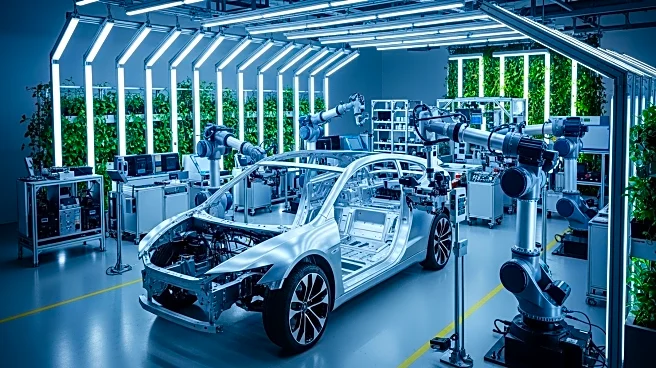What's Happening?
The automotive industry is increasingly focusing on sustainable manufacturing practices, emphasizing efficiency over complexity. Companies like BMW and Toyota are integrating advanced technologies such as AI and IoT to optimize production processes, reduce waste, and enhance resource efficiency. This shift is driven by the need to address environmental challenges and improve economic viability. For instance, BMW's San Luis Potosí plant in Mexico uses digital twin technology and AI algorithms to predict energy demands, while Toyota employs IoT-based predictive maintenance systems in its North American operations. These initiatives aim to reduce material waste and improve operational efficiency, aligning environmental sustainability with economic goals.
Why It's Important?
The move towards sustainable manufacturing in the automotive sector has significant implications for both the environment and the economy. By reducing waste and optimizing resource use, companies can lower their carbon footprint and operational costs simultaneously. This dual benefit creates a competitive advantage, encouraging wider adoption of sustainable practices across the industry. Moreover, the integration of advanced technologies not only enhances production efficiency but also positions companies as leaders in innovation. As sustainability becomes a key factor in consumer and regulatory expectations, companies that prioritize these practices are likely to gain market share and improve their long-term viability.
What's Next?
The automotive industry is expected to continue its transition towards more sustainable manufacturing practices. This includes further integration of advanced technologies and a focus on resource efficiency. Companies may also explore new business models that emphasize durability and repairability over disposability, potentially reshaping consumer expectations and supply chain structures. As the industry navigates these changes, collaboration with suppliers and investment in recycling infrastructure will be crucial to achieving broader sustainability goals. The ongoing evolution of sustainable manufacturing practices will likely influence regulatory frameworks and consumer preferences, driving further innovation and adoption.
Beyond the Headlines
The shift towards sustainable manufacturing raises important questions about the future of production and consumption. As companies strive to balance environmental and economic objectives, they must also consider the social implications of these changes, such as workforce displacement due to automation. Additionally, the industry's focus on efficiency and resource reduction challenges traditional growth models, prompting a reevaluation of what constitutes 'enough' production. This broader conversation about sustainability may lead to more fundamental changes in how products are designed, manufactured, and consumed, with potential impacts on global supply chains and economic systems.








